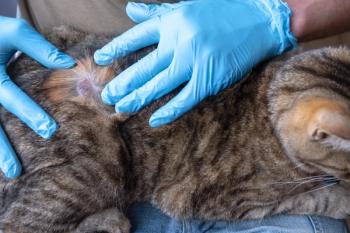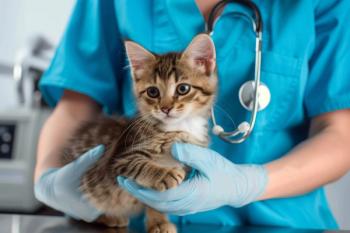
Attitudes and perspectives of the female forefront
At some point, female owners must develop a balance between the business and their families.
The attitude of being the best veterinarian possible has propelled female veterinarians to not only succeed in their chosen profession, but also dominate it.
Dr. Judith Brown
There is a direct correlation between age, experience and position in veterinary practices. Men are more likely to be owners or partners while women largely are associates.
A recent survey by DVM Newsmagazine reveals these factors affect hours worked, compensation, health insurance and benefits received. This, in return, has direct influence on veterinarians' attitudes and perspectives about their profession.
Marylou Wittenauer, DVM, a practice owner in Youngstown, Ohio, says her mentor gave her the first dose of a stereotypical male perspective on females in the profession.
"He openly said women wouldn't be good for the profession because they would need to take time off to have families," Wittenauer says. "He always talked about getting good grades and doing well in school but thought it wasn't fair to the universities to train women who 'wouldn't work a full 40 years,'" she says.
Dr. Marsha Anderson
Wittenauer's mentor helped her to develop technical skills and wrote her a letter of reference to The Ohio State University College of Veterinary Medicine, but he believed that women belonged in the home.
"In the 1990s, he began to realize and accept that women were very much so making their mark on the profession and was OK with that," Wittenauer says.
Wittenauer practiced veterinary medicine for seven years in New York before returning to Ohio and buying out the veterinarian who had once been against female practitioners.
In college Wittenauer says she had to make choices to get the job done. Competition was steep, and grades had to be stellar to be a competitive applicant, which meant making a few sacrifices along the way.
"I didn't get to take some classes that were interesting to me because they would have drawn from the classes I needed for the veterinary program," Wittenauer says. "So I don't know anything about botany."
"Being a good veterinarian in part is learning how to read people," she adds. "My attitude is I know I'm a good veterinarian. If a client is unable to see that in my work and they are concerned about my gender, they can take their pet somewhere else. You cannot make everyone happy even if you really try," she adds.
At some point, female practice owners must develop a balance between management of the business, clients, staff and their families.
"I was unbelievably submerged in the profession and needed to learn to enjoy something other than veterinary medicine," Wittenauer says. "I took up scuba diving, met my husband and eventually got married and had children. You can't do it all, and that was hard to accept. I am happy with how everything balances now."
Women who bring their pets for healthcare like to see a female veterinarian says Dr. Judith Brown, a 1976 Purdue graduate and La Port, Ind., associate.
Mentors helped mold Brown's perspective on the profession, she says, mentioning two female veterinarians she knew growing up.
"We took our pets to Dr. Carol Ecker, a Purdue graduate," Brown says. "When I was old enough to work in the summertime, I worked with a female associate veterinarian named Beverly Holt. With two women veterinarian role models, gender wasn't going to be an excuse not to become a veterinarian."
Individual personality matters more in a veterinarian than gender, Brown says. Many clients say female veterinarians are more gentle and caring, but that is just a stereotype, she adds.
"Older male clients used to be negative about me treating their pet," Brown says. "I would have to prove myself every time I went in a room."
Browns says her attitude about clients and her position in the profession is that she knows her job and isn't interested in arguing with anyone who questions her or her ability.
"Today the profession is full of women, and my position is that continuing my education by attending AVMA conventions and other CE meetings keeps me informed on new things," Brown says. "I am happy with my position and job."
When Dr. Marsha Anderson began veterinary school at Texas A&M in 1983, she definitely noticed there were more men than women in her class.
"About 35 to 40 percent of the class was female when I graduated," Anderson says. "Probably the opposite of what it is today."
Anderson says she can't recall being discriminated against as a female veterinary student or practitioner and adds that male coworkers from past places of employment remain good friends of hers.
"Being a female veterinarian isn't without its benefits," she says, adding she has found that a lot of people are happy to discover their pets' doctor is female, making statements such as, 'My dog likes women more than men.'"
And in many households, women tend to be more likely to bring pets to the veterinarian, Anderson says, so this sometimes makes female clients happy to communicate with another woman.
Anderson works four days a week at Ashford Veterinary Hospital in Houston in addition to owning a mobile veterinary clinic.
Practice ownership is something Anderson says she always had planned on achieving, but there was a lot of planning and financing to handle before the process began.
"There are so many elements to buying and owning your own practice," Anderson says. "There are plenty of things involved that can make a young veterinarian discouraged from jumping into buying into or buying their own practice."
Most students graduate with student loans and have a lot on their plate. Anderson says, finances and family top her list.
Getting through veterinary school in itself was a hardship, Anderson says.
"If you're not in class you are studying," she says. "Your personal and professional life becomes intertwined, which isn't necessarily a bad thing."
The challenge of launching a practice is planning for and managing the many different parts of the business, Anderson says.
"You have to formulate a business plan, establish scheduling, how to organize inventory, research equipment, get ordering under control and hire staff," Anderson says. "You have to consider payroll and benefits, get practice insurance and general insurance.
"I am single and do not have children, but I am very close with my family, and that is really difficult to balance sometimes."
Finding time for family while keeping clients and patients well serviced is a balancing act, Anderson says.
"When my father, who lives in Georgia, was ill, I relied on cell phones to communicate with clients," she says. "I'm still working on my days off."
Anderson says she enjoys soft tissue surgery, internal medicine and dermatology but is not board certified in those specialties.
Choosing to purchase a mobile veterinary clinic was a decision made to best serve her clients, she says.
"When I opened my clinic, I was in a more rural area where clients were more spread out. It was much easier to access everyone with a mobile clinic," Anderson says.
"Veterinarians in general, regardless of their gender, don't go into the profession for money," she says. "I would be surprised to hear a female veterinarian saying there was a disadvantage to their gender."
Newsletter
From exam room tips to practice management insights, get trusted veterinary news delivered straight to your inbox—subscribe to dvm360.






